5BGeneral Guidelines for National Parks
National Parks of Canada and National Park Reserves of
Canada
General Guidelines for National Parks and National Park
Reserves
Under the Canada National Parks Act, S.C. 2000, c. 32, the Parks Canada Agency has the authority to administer national parks (listed under Schedule 1 of the Act) and national park reserves (listed under Schedule 2 of the Act) on behalf of the people of Canada and is responsible for granting permission to enter any lands or waters for which it has jurisdiction. Visitor permits and/or business licenses are required before entering the boundaries of all national parks and national park reserves, and other permitting requirements may exist, including for research.
For general information regarding Canada's National Parks and National Park Reserves, please contact the Parks Canada National Information Service at 1-888-773-8888, email information@pc.gc.ca, or visit the Parks Canada website.
1.National Parks in Nunavut
With the exception of Inuit accessing national parks for rights-based activities under the Nunavut Agreement, anyone entering a national park in Nunavut, including all marine areas, requires authorization from Parks Canada. Authorization normally occurs through a visitor use permit, a business licence, or a research permit.
All persons wishing to enter marine areas of national parks in Nunavut must contact local Parks Canada staff and register prior to entering. Additional permit requirements and restrictions may apply.
1.1Quttinirpaaq National Park of Canada
Coordinates
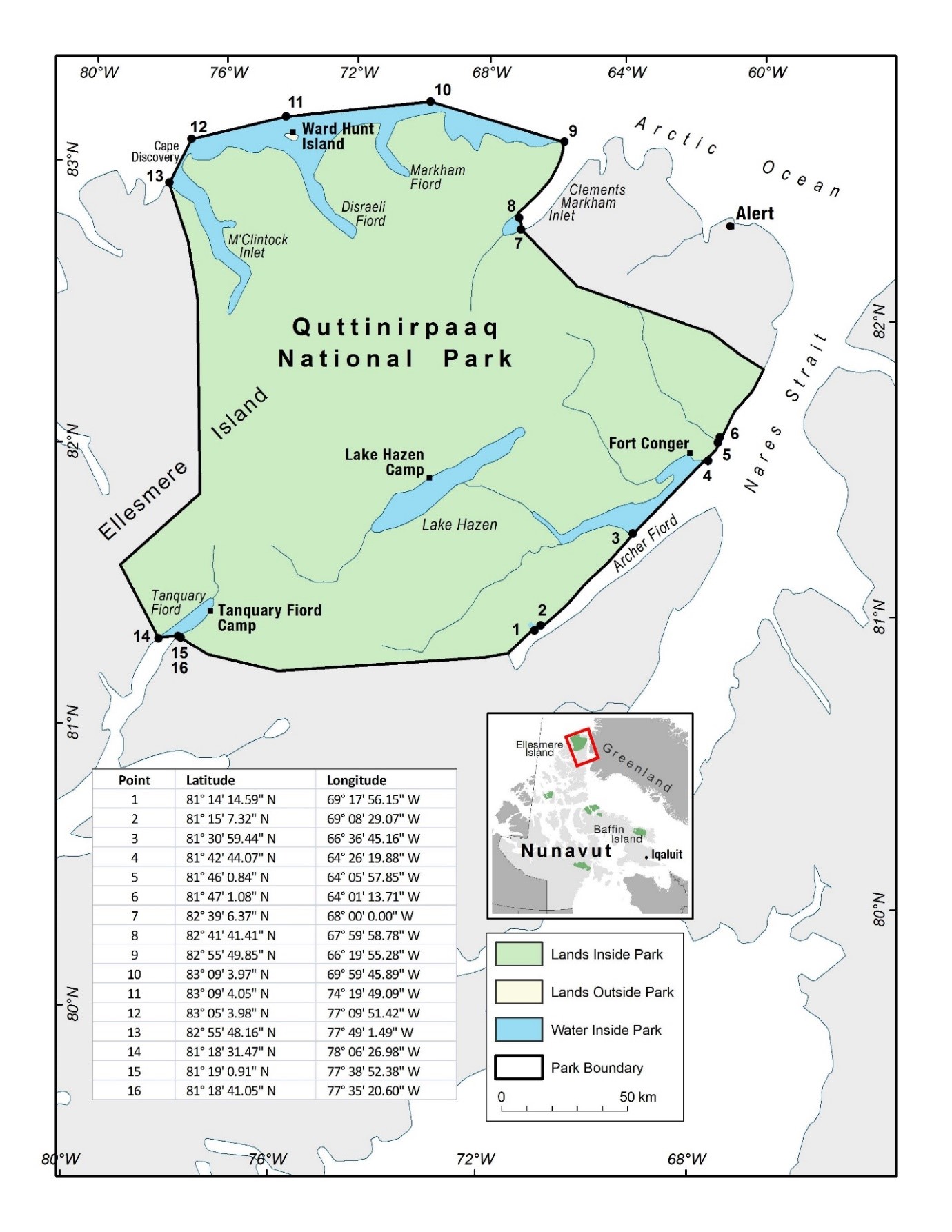
Restrictions
With the exception of Inuit accessing the national park for
rights-based activities under the Nunavut Agreement, persons
wishing to enter marine areas within Quttinirpaaq National Park
must contact Parks Canada at 1-867-975-4673 or at nunavut.info@pc.gc.ca prior
to entering the national park.
The following additional restrictions and prohibitions also
apply:
•Cruise ship access may only be permitted in Tanquary Fiord; cruise ships are prohibited in all other marine areas.
•Private motorized activities are prohibited.
•Recreational fishing is prohibited.
Permitting Requirements
Visitor use permits are required for all visitors. A visitor use
permit is granted after visitors participate in a mandatory
orientation, register and pay the park use fee. To arrange an
orientation and obtain a visitor permit, contact Parks Canada in
advance of your trip.
In addition to visitor use permits, permits are required for
operating a business (guiding, outfitting), filming and
commercial photography, landing an aircraft, establishing a
cache or base camp, or transporting a firearm through the park.
Permit applications may take up to 90 days to be processed. Not
all activities are permitted in national parks. For further
information, or to apply for one of these permits, contact
nunavut.info@pc.gc.ca (May
to November) field work and by October 30 for winter and spring
(December to April) field work. Contact
rechercheparcsnunavut-nunavutparksresearch@pc.gc.ca
for details on what is required in research and collection
permit applications.
Reporting of Incidents
All incidents occurring within Quttinirpaaq National Park must be promptly reported to Parks Canada by calling 1-877-852-3100 or 1-780-852-3100.
Contact Information
Quttinirpaaq National Park
Parks Canada
PO Box 278
Iqaluit, NU
X0A 0H0
Phone: 1-867-975-4673
Fax: 1-867-975-4674
Email: nunavut.info@pc.gc.ca
1.2Auyuittuq National Park of Canada
Coordinates
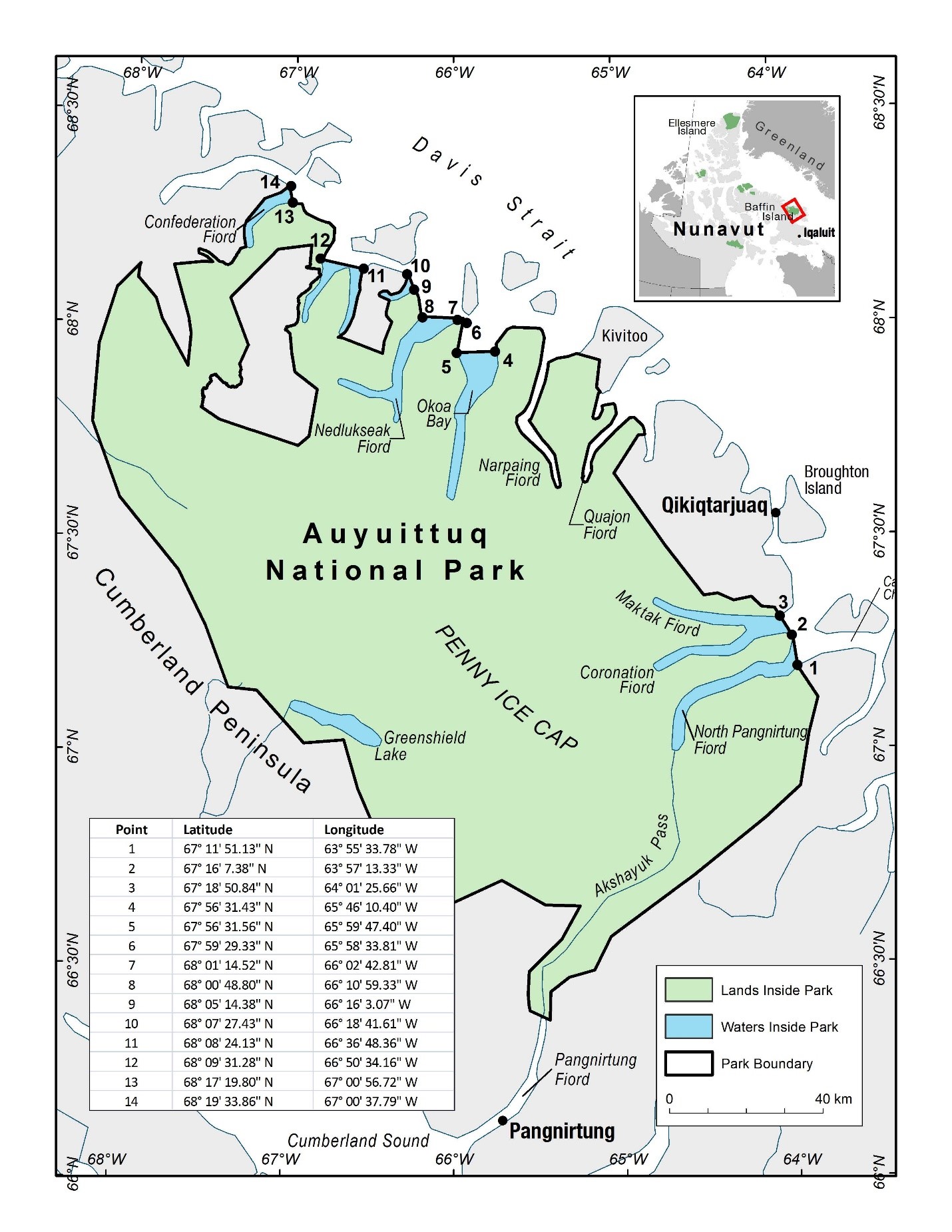
Restrictions
With the exception of Inuit accessing the national park for
rights-based activities under the Nunavut Agreement, persons
wishing to enter marine areas within Auyuittuq National Park must
contact Parks Canada staff in Pangnirtung at 1-867-473-2500, in
Qikiqtarjuaq at 1-867-927-8834, or at nunavut.info@pc.gc.ca prior
to entering the national park.
The following additional restrictions and prohibitions also
apply:
•Private motorized activities are prohibited in all marine areas.
•Cruise ships are
currently prohibited in fiords located within the national
park.
•Commercially
guided motorized boat access may be permitted within
Coronation, Maktak, and North Pangnirtung Fiords.
•All
marine areas of Coronation and Maktak Fiords are seasonally
closed to access in late August or early September for the
remainder of the calendar year to enable Inuit to undertake
rights-based activities. Closure dates vary from year to year,
according to the timing of activities. Contact Parks Canada
staff in Qikiqtarjuaq (1-867-927-8834) for details on this
closure.
•Recreational fishing requires a permit.
Permitting Requirements
Visitor use permits are required for all visitors. A visitor use
permit is granted after visitors participate in a mandatory
orientation, register and pay the park use fee. To arrange an
orientation and obtain a visitor permit, contact Parks Canada in
advance of your trip.
In addition to visitor use permits, permits are required for
operating a business (guiding, outfitting), filming and
commercial photography, landing an aircraft, establishing a
cache, base camp, transporting a firearm through the park, or
recreational fishing. Permit applications may take up to 90
days to be processed. Not all activities are permitted in
national parks. For further information, or to apply for one of
these permits, contact nunavut.info@pc.gc.ca.
Permit applications for research and collection activities
within park boundaries need to be submitted by February 28 for
summer and fall (May to November) field work and by October 30
for winter and spring (December to April) field work. Contact
rechercheparcsnunavut-nunavutparksresearch@pc.gc.ca
for details on what is required in research and collection
permit applications.
Reporting of Incidents
All incidents occurring within Auyuittuq National Park must be promptly reported to Parks Canada by calling 1-877-852-3100 or 1-780-852-3100.
Contact Information
|
Auyuittuq National Park |
or |
Auyuittuq National Park |
|
Email : nunavut.info@pc.gc.ca |
||
1.3Sirmilik National Park of Canada
Coordinates
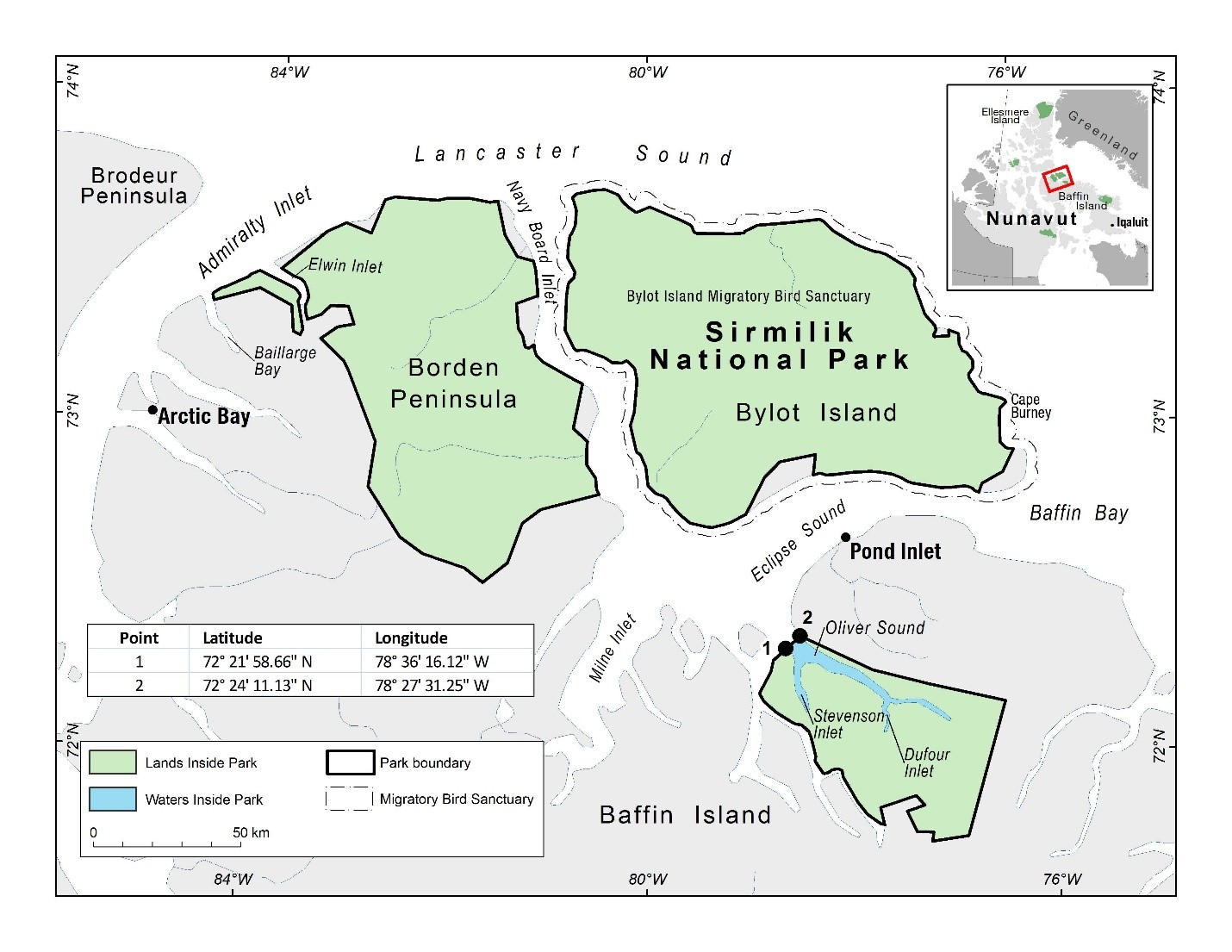
Restrictions
With the exception of Inuit accessing the national park for
rights-based activities under the Nunavut Agreement, persons
wishing to enter marine areas within Sirmilik National Park must
contact Parks Canada staff at 1-867-899-8092 or at sirmilik.info@pc.gc.ca
prior to entering the national park.
The following additional restrictions and prohibitions also
apply:
•Access to Oliver Sound requires a permit and/or business license
•Large vessels (e.g., cruise ships) are prohibited from entering Oliver Sound.
•Recreational fishing is prohibited.
Permitting Requirements
Visitor use permits are required for all visitors. A visitor use permit is granted after visitors participate in a mandatory orientation, register and pay the park use fee. To arrange an orientation and obtain a visitor permit, contact Parks Canada staff in advance of your trip.
In addition to visitor use permits, permits are required for
operating a business (guiding, outfitting), filming and
commercial photography, landing an aircraft, establishing a cache
or base camp, or transporting a firearm through the park. Permit
applications may take up to 90 days to be processed. Not all
activities are permitted in national parks. For further
information, or to apply for one of these permits, contact
sirmilik.info@pc.gc.ca.
Permit applications for research and collection activities
within national park boundaries need to be submitted by
February 28 for summer and fall (May to November) field work
and by October 30 for winter and spring (December to April
field work). Contact
rechercheparcsnunavut-nunavutparksresearch@pc.gc.ca
for details on what is required in research and collection
permit applications.
Additional Recommendations
For access to waters adjacent to Bylot Island, the Canadian Wildlife Service should be contacted because it is responsible for the management of the Bylot Island Migratory Bird Sanctuary, which includes a marine component.
Reporting of Incidents
All incidents occurring within Sirmilik National Park must be promptly reported to Parks Canada by calling 1-877-852-3100 or 1-780-852-3100.
Contact Information
Sirmilik National Park
Parks Canada
PO Box 300
Pond Inlet, NU
X0A 0S0
Phone: 1-867-899-8092
Fax: 1-867-899-8104
Email: sirmilik.info@pc.gc.ca
1.4Ukkusiksalik National Park of Canada
Coordinates
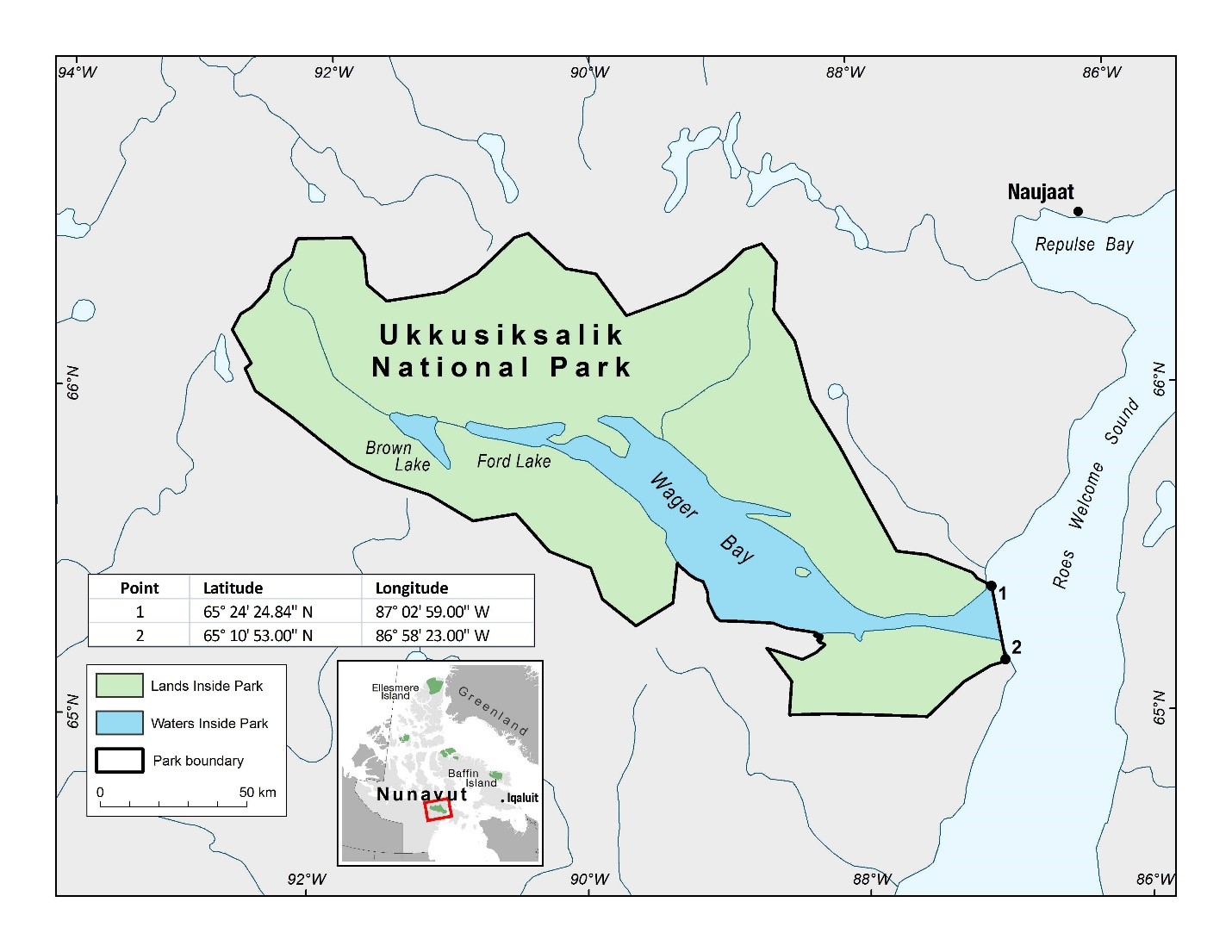
Restrictions
With the exception of Inuit accessing the national park for
rights-based activities under the Nunavut Agreement, persons
wishing to enter marine areas within Ukkusiksalik National Park
must contact Parks Canada staff at 1-867-462-4500 or at
ukkusiksalik.info@pc.gc.ca
prior to entering the national park.
The following additional restrictions also apply:
•Access to Wager Bay requires a permit and/or business license.
•Anyone wishing to enter into, use and/or travel through Ukkusiksalik National Park must be accompanied by an authorized bear guard while in the national park.
Permitting Requirements
Visitor use permits are required for all visitors. A visitor use
permit is granted after visitors participate in a mandatory
orientation, register and pay the park use fee. To arrange an
orientation and obtain a visitor permit, contact Parks Canada
staff in advance of your trip.
In addition to visitor use permits, permits are required for
operating a business (guiding, outfitting), filming and
commercial photography, landing an aircraft, establishing a
cache or base camp, or transporting a firearm through the park.
Permit applications may take up to 90 days to be processed. Not
all activities are permitted in national parks. For further
information, or to apply for one of these permits, contact
ukkusiksalik.info@pc.gc.ca.
Permit applications for research and collection activities
within park boundaries need to be submitted by February 28 for
summer and fall (May to November) field work and by October 30
for winter and spring (December to April) field work. Contact
rechercheparcsnunavut-nunavutparksresearch@pc.gc.ca
for details on what is required in research and collection
permit applications.
Reporting of Incidents
All incidents occurring within Ukkusiksalik National Park should be promptly reported to Parks Canada by calling 1-877-852-3100 or 1-780-852-3100.
Contact Information
Ukkusiksalik National Park
Parks Canada
P.O. Box 220
Naujaat, NU
X0C 0H0
Phone: 1-867-462-4500
Fax: 1-867-462-4095
Email: ukkusiksalik.info@pc.gc.ca
1.5Qausuittuq National Park of Canada
Coordinates
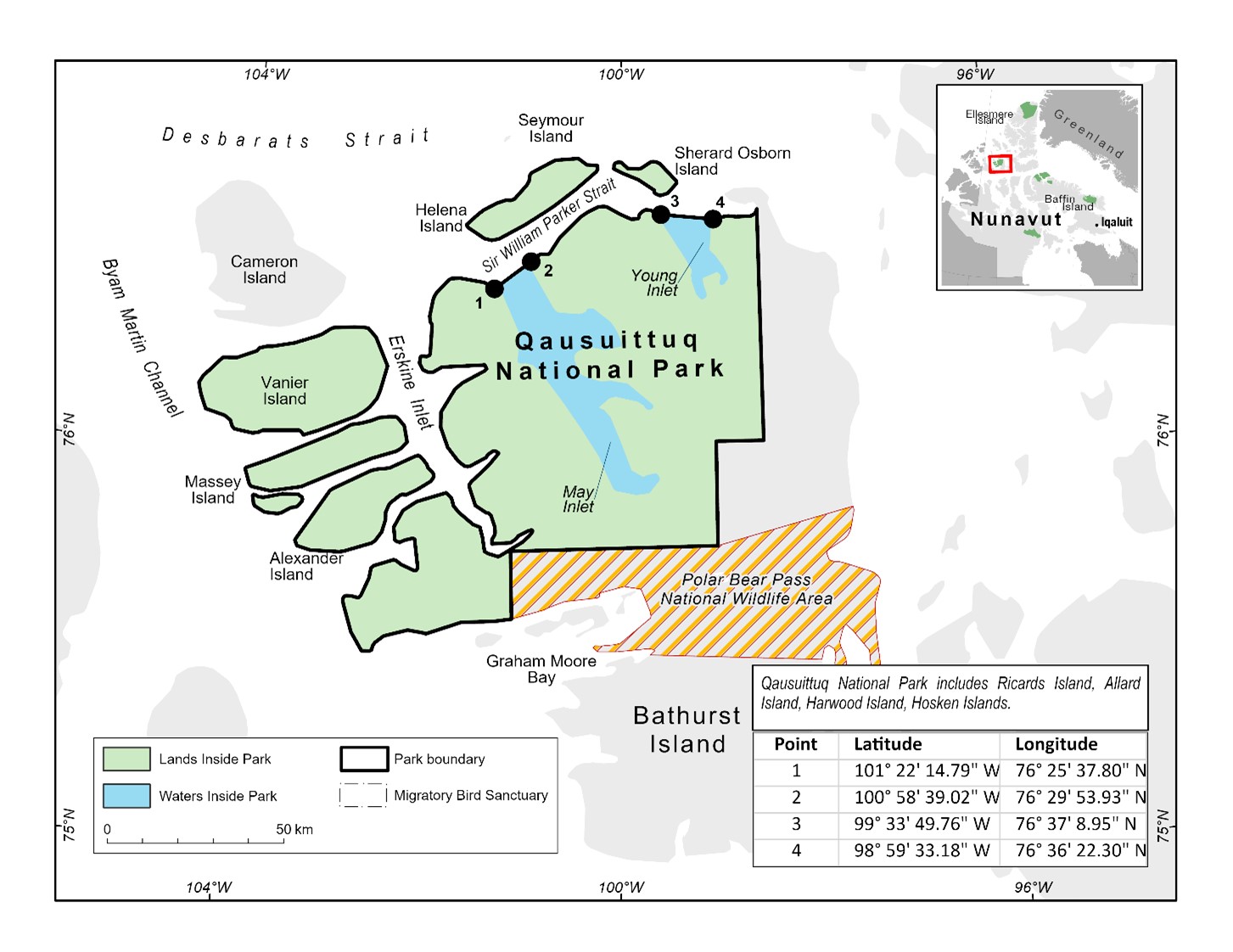
Restrictions
With the exception of Inuit accessing the national park for
rights-based activities under the Nunavut Agreement, persons
wishing to enter marine areas within Qausuittuq National Park
must contact Parks Canada staff at 1-867-252-3000 or at
nunavut.info@pc.gc.ca
prior to entering the national park.
The following additional restrictions also apply:
•Access to May and Young Inlets requires a permit and/or business license.
Permitting Requirements
Visitor use permits are required for all visitors. A visitor use
permit is granted after visitors participate in a mandatory
orientation, register and pay the park use fee. To arrange an
orientation and obtain a visitor permit, contact Parks Canada
staff in advance of your trip.
In addition to visitor use permits, permits are required for
operating a business (guiding, outfitting), filming and
commercial photography, landing an aircraft, establishing a
cache or base camp, or transporting a firearm through the park.
Permit applications may take up to 90 days to be processed. Not
all activities are permitted in national parks. For further
information, or to apply for one of these permits, please
contact nunavut.info@pc.gc.ca.
Permit applications for research and collection activities
within park boundaries need to be submitted by February 28 for
summer and fall (May to November) field work and by October 30
for winter and spring (December to April) field work. Contact
rechercheparcsnunavut-nunavutparksresearch@pc.gc.ca
for details on what is required in research and collection
permit applications.
Reporting of Incidents
All incidents occurring within Qausuittuq National Park should be promptly reported to Parks Canada by calling 1-877-852-3100 or 1-780-852-3100.
Contact Information
Qausuittuq National Park
Parks Canada
PO Box 123
Resolute Bay , NU, X0A 0V0
Phone: 1-867-252-3000
Email: nunavut.info@pc.gc.ca
2.Coastal National Parks in Eastern Canada
2.1Kouchibouguac National Park of Canada
Coordinates
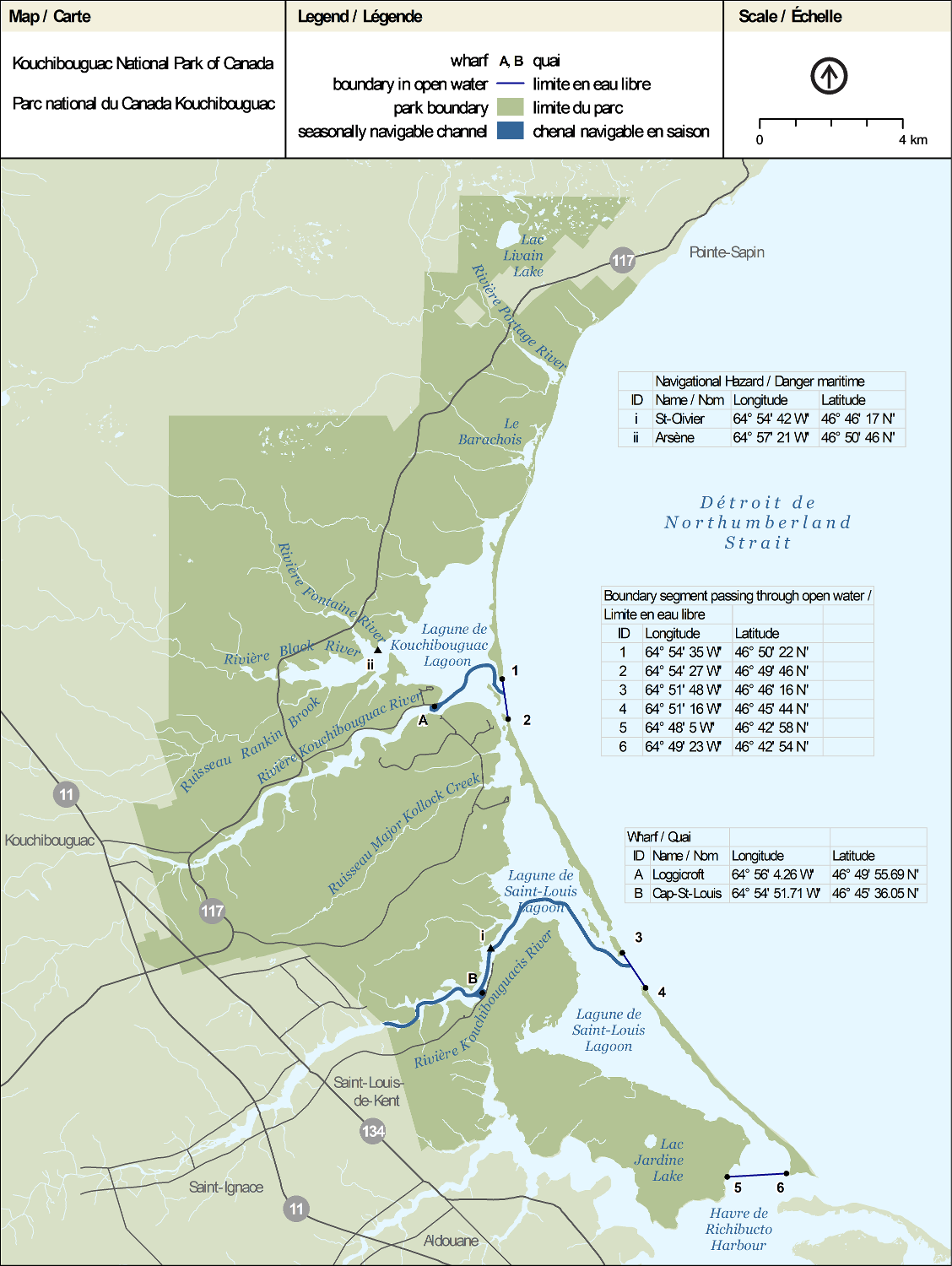
Coordinates marking boundary segments passing through open water are given in the table below. These locations are approximate since sand can shift from year to year and during extreme weather events.
|
ID |
Longitude |
Latitude |
|
1 |
64º 54' 35" W |
46º 50' 22" N |
|
2 |
64º 54' 27" W |
46º 49' 46" N |
|
3 |
64º 51' 48" W |
46º 46' 16" N |
|
4 |
64º 51' 16" W |
46º 45' 44" N |
|
5 |
64º 48' 05" W |
46º 42' 58" N |
|
6 |
64º 49' 23" W |
46º 42' 54" N |
Two wharves operate within Kouchibouguac National Park for the purpose of supporting commercial fishing operations as well as recreational boating.
Coordinates of the wharves are:
|
ID |
Name / Nom |
Longitude |
Latitude |
|
A |
Loggiecroft |
64° 55' 48" W |
46° 49' 57" N |
|
B |
Cap-St-Louis |
64° 54' 45" W |
46° 46' 02" N |
Mariners are advised of the possibility of remnant wharf piles near the surface of the water in two areas of the park. Their depth and visibility varies with the tides and turbidity of the water. Navigate with extreme caution in these areas. Two navigational danger buoys are installed each year by Parks Canada at the Arsène location from April 15 to October 31.
Coordinates of these hazards are :
|
ID |
Name / Nom |
Longitude |
Latitude |
|
i |
St-Olivier |
64° 54' 42 W" |
46° 46' 17 N" |
|
ii |
Arsène |
64° 57' 21 W" |
46° 50' 46 N" |
Notes:
Boundary of outward (or easterly) edge of sand beaches can change
from year to year and with extreme weather events which cause
sand to shift.
Navigable water channels on the Kouchibouguac River from
Loggiecroft Wharf to the Northumberland Strait and on the
Kouchibouguacis River from the westerly park boundary to the
Northumberland Strait, including the wharf at Cap-St-Louis, are
marked from April 20 to October 30 subject to ice conditions
and fishing seasons.
Coordinates are derived using the NAD83 datum.
Restrictions
•Personal watercrafts (“Jet skis”) are prohibited in all
park waters at all times.
•Night-time boating is only permitted within marked
channels on the Kouchibouguac and Kouchibouguacis rivers.
•Overnight anchoring (mooring) of boats is prohibited outside the authorized limits of the wharves.
•Please respect the marked “closed” and “study” zones of the park, where important nesting sites and sensitive ecological areas are located.
Contact Information
Kouchibouguac National Park
Parks Canada
186, Route 117
Kouchibouguac National Park, New Brunswick
E4X 2P1
Phone: 506-876-2443
Fax: 506-876-4802
Email:
kouchibouguac@pc.gc.ca
3.National Parks in Central Canada
3.1Thousand Islands National Park of Canada
Coordinates
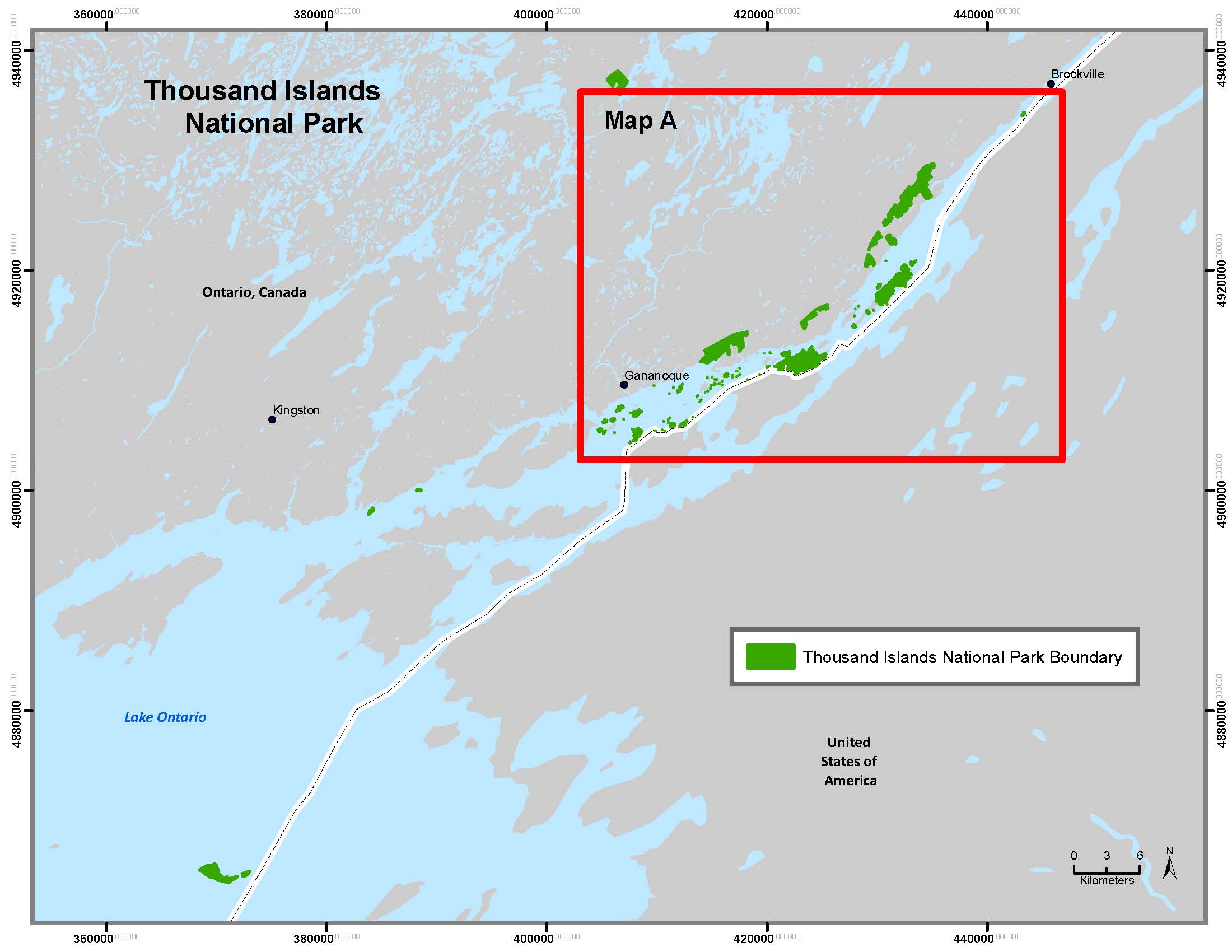
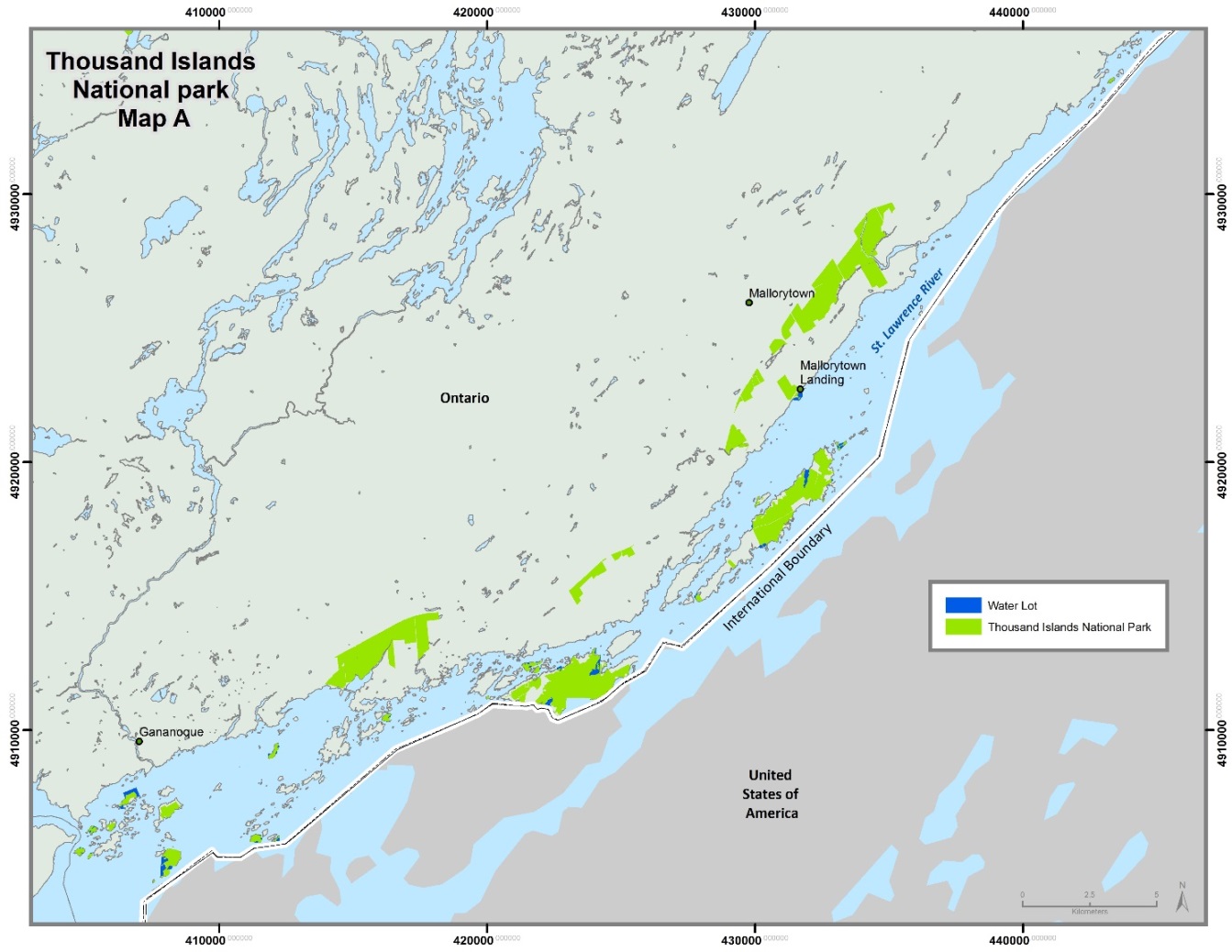
Thousand Islands National Park consists of several ecologically
important mainland properties and more than 20 islands
between Kingston and Brockville.
Established in 1904 as the first Canadian national park east of
the Rockies, Thousand Islands celebrated its centennial in
2004. The park islands and mainland properties are protected
under the Canada National Park Act (S.C. 2000, c.32).
Restrictions
Thousand Islands manages sixty-two water lots along the park’s shoreline (see Map A above). Most water lots have public access docks or mooring cans which require permits for daily or overnight use. The water lot in front of Central Grenadier Island contains a quiet zone marked by water spars.
Contact
To purchase permits or for further questions concerning Thousand Islands National Park, contact us at:
Thousand Islands National Park
Parks Canada
2 County Rd 5
Mallorytown, ON
K0E 1R0
Phone: 613-923-5261
Email: pnmille-iles-thousandislandsnp@pc.gc.ca
Web: www.pc.gc.ca/en/pn-np/on/1000
3.2Georgian Bay Islands National Park of Canada
Coordinates
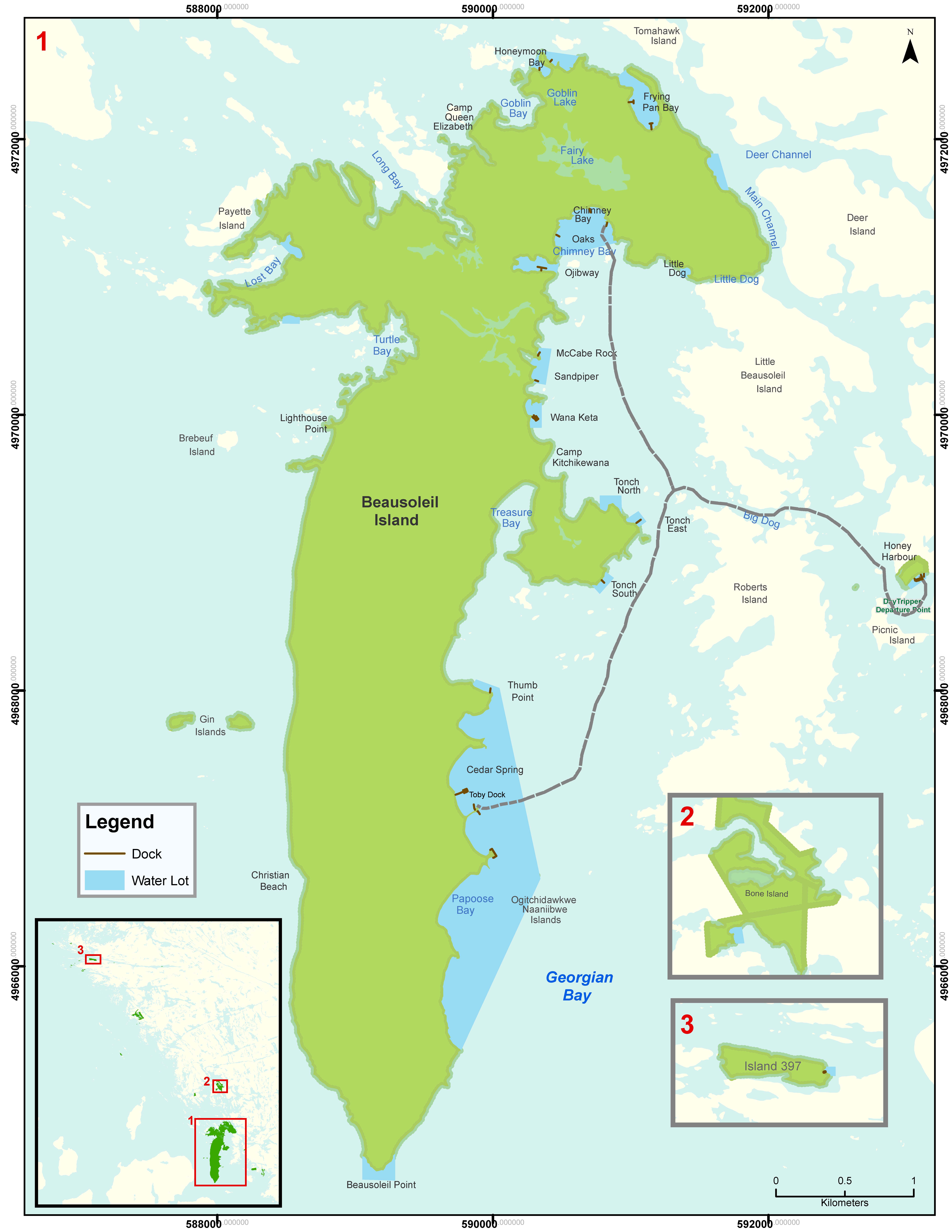
Georgian Bay Islands National Park of Canada
Georgian Bay Islands National Park is made up of 48 islands
that are strewn along 50 km of eastern Georgian Bay from
Honey Harbour to Twelve Mile Bay and are part of the world famous
30,000 Islands. Beausoleil Island is the largest park island and
is the hub for activities.
Established in 1929, Georgian Bay Islands National Park
straddles an area of St. Lawrence lowlands and pure
Canadian Shield and forms a core part of the Georgian Bay
Biosphere Reserve. The park islands are protected under the
Canada National Park Act (S.C. 2000, c.32).
Restrictions
Georgian Bay Islands manages several water lots along the park’s
shoreline (see map above). Several water lots have public access
docks which require mooring permits.
The water lot in front of Cedar Spring contains a quiet zone
marked by water spars and a designated swimming area. The Tobey
dock within this water lot is also monitored for length of stay
restrictions. The water lot in Chimney Bay contains a quiet zone
marked by water spars.
Contact
To purchase permits or for further questions concerning Georgian Bay Islands National Park, contact us at:
Georgian Bay Islands National Park
Parks Canada
901 Wye Valley Rd, Box 9
Midland, ON
L4R 4K6
Phone: 705-527-7200
Fax: 705-526-5939
Email: info.gbi-ibg@pc.gc.ca
Georgian Bay Islands National Park website
4National Parks in Yukon
4.1Ivvavik National Park of Canada
Ivvavik, meaning ‘a place for giving birth, a nursery,' in Inuvialuktun, the language of the Inuvialuit, was established to protect a portion of the calving grounds of the Porcupine caribou herd and represent the Northern Yukon and Mackenzie Delta natural regions.
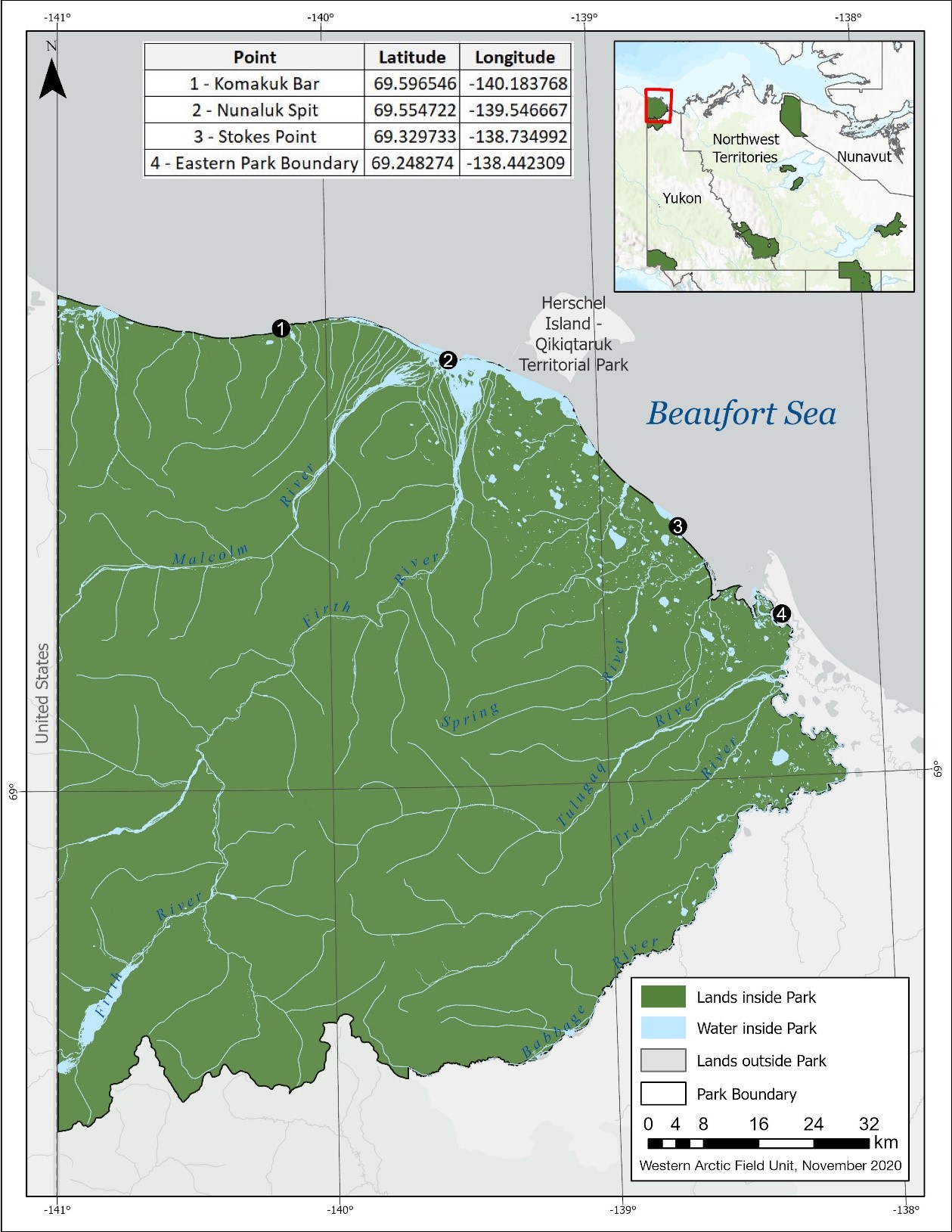
Ivvavik National Park includes all shoals, islands, sandbars and spits that may be periodically exposed at low tide within 3.5 kilometres of the shore and all islands, sandbars and spits lying within Phillips Bay, not including Herschel Island and its sandbars spits and immediately adjoining islets.
Restrictions
With the exception of Inuvialuit to whom the Inuvialuit Final
Agreement applies, anyone entering Ivvavik National Park,
including all vessels wishing to enter marine areas or land a
vessel within Ivvavik National Park must register with the Parks
Canada office by phone at 1-867-777-8800 prior to entering the
park. Additional permit requirements and restrictions may
apply.
The following activities are restricted or prohibited:
•Trapping, hunting and firearms - Only traditional harvesters who have the free and unrestricted right of access to the national park for the purpose of harvesting may engage in trapping, hunting and the carrying of firearms;
•Mining
- Panning for gold, mining, and mineral exploration is
prohibited. It is illegal to remove, deface, damage or destroy
rocks, minerals, and other natural objects;
•Fires
- Open fires are prohibited in the park, except at
Nunaluk Spit;
•Off-road
Vehicles - The use of ATVs, snowmobiles, dirt bikes,
or other off-road vehicles for recreational purposes is
prohibited;
•Garbage and human waste - All garbage, including human waste, must be packed out. Burning or burying garbage and waste is not acceptable.
Permitting Requirements
For information on obtaining a permit for any of the activities listed below, please contact the Parks Canada office in Inuvik by phone at 1-867-777-8800 or email at infoinuvik-inuvikinfo@pc.gc.ca. Please note that some permit applications are subject to external impact assessment processes and it may take up to four (4) months to issue a permit. Permits are required in advance for the following activities:
•Visitor
Use Permits - All day use, overnight, and multi-day trip
visitors must obtain a Parks Canada permit and must register
prior to entering ;
•Military
exercises - All personnel and equipment operating on
behalf of any Canadian or foreign armed forces for the purposes
of training, or entry and travel by any means;
•Fuel
caching - Storage of petroleum-based fuel in any
location for future use;
•Food
caching - Storage of food stuffs in any location for
future use;
•Filming or photography for commercial purposes - Filming and photography activities conducted where the photographer:
1)is working to fulfill a commercial contract (including
stock agencies);
2)is salaried for the purpose; or
3)Requires special permission or assistance from Parks
Canada to access areas or resources (including Parks Canada
staff);
•Use of drones/UAVs- The use of drones/UAVs requires a special permit, unauthorized use is illegal;
•Research
and collection – All research and collection of data and
objects (including all natural science, social science, and
archaeological research and collection), requires a permit;
•Fishing
– An Ivvavik National Park Fishing Permit is required, daily
catch and possession limit for Dolly Varden is reduced to 1,
the aggregate daily catch and possession limit for all species
is reduced to 3, and several inland lakes and rivers are closed
to all fishing; and
•Transporting a firearm through the Park- Firearms may be transported through the park to another destination, but must be unloaded and securely encased.
Reporting of Incidents
Please report all all incidents, including those relating to wildlife, safety, spills and violations occurring within Ivvavik National Park promptly to Parks Canada by calling 1-877-852-3100.
Contact Information
Ivvavik National Park
Parks Canada
81 Kingmingya Road
P.O. Box 1840
Inuvik, Northwest Territories
Canada X0E 0T0
Phone: 867-777-8800
Fax: 867-777-8820
Email: infoinuvik-inuvikinfo@pc.gc.ca
Ivvavik National Park website
5National Parks in Northwest Territories
5.1Aulavik National Park of Canada
Aulavik, meaning “ place where people travel ” in Inuvialuktun, protects more than 12,000 square kilometres of arctic lowlands on the north end of Banks Island. The park encompasses a variety of landscapes from fertile river valleys to polar deserts, buttes and badlands, rolling hills, and bold seacoasts. Aulavik National Park is one of the most isolated parks in North America, and rescue services and facilities are limited.
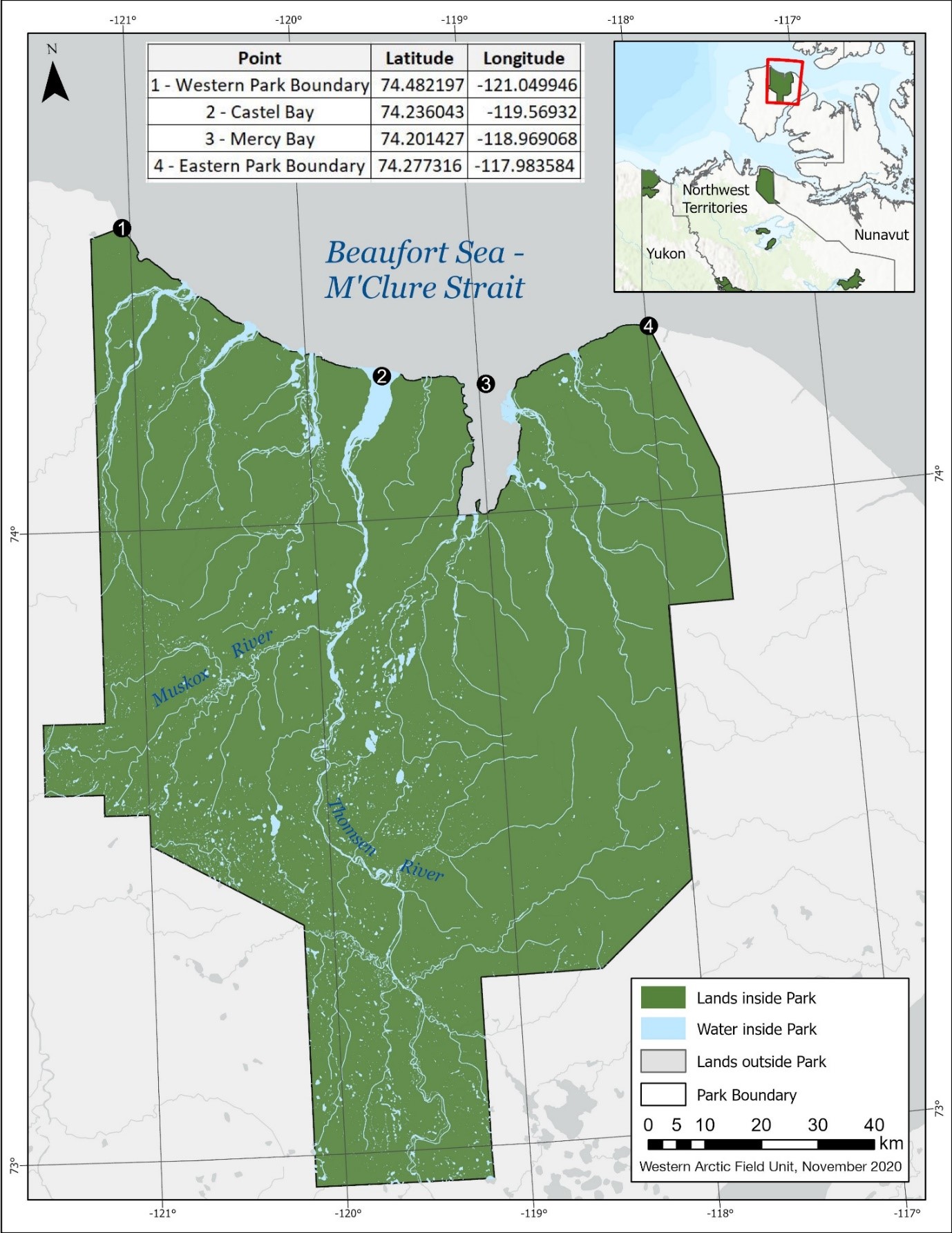
Restrictions
Inuvialuit, to whom the Inuvialuit Final Agreement
applies, have the free and unrestricted right of access to the
national park for the purpose of harvesting. With the exception
of Inuvialuit, all vessels wishing to enter marine areas or land
a vessel within Aulavik National Park must contact the park
office in Inuvik by phone at 1-867-777-8800 prior to entering the
park.
All visitor groups that require a stop in the community of
Sachs Harbour en route to Aulavik National Park should contact
the Hamlet of Sachs Harbour prior to booking their trip to
receive the most current information on access, restrictions or
precautions in Sachs Harbour.
The following activities are restricted or prohibited:
•Trapping, hunting and firearms - Only traditional harvesters who have the free and unrestricted right of access to the national park may engage in trapping, hunting and the carrying of firearms;
•Mining
- Panning for gold, mining, and mineral
exploration is prohibited. It is illegal to remove, deface,
damage or destroy rocks, minerals, and other natural
objects;
•Fires
-
Open fires are prohibited in the park;
•Off-road
Vehicles - The use of ATVs, snowmobiles, dirt bikes,
or other off-road vehicles for recreational purposes is
prohibited; and
•Garbage and human waste - All garbage, including human waste, must be packed out. Burning or burying garbage and waste is not acceptable.
Permitting Requirements
For information on obtaining a permit for any of the activities listed below, please contact the Parks Canada office in Inuvik by phone at 867-777-8800 or email at infoinuvik-inuvikinfo@pc.gc.ca. Please note that some permit applications are subject to external impact assessment processes and it may take up to four (4) months to issue a permit. Permits are required in advance for the following activities:
•Visitor
Use Permits - All day use, overnight, and multi-day trip
visitors require a Parks Canada permit and must register prior to
entering the park;
•Military
exercises - All personnel and equipment operating on
behalf of any Canadian or foreign armed forces for the purposes
of training, or entry and travel by any means;
•Fuel
caching - Storage of petroleum-based fuel in any
location for future use;
•Food
caching - Storage of food stuffs in any location for
future use;
•Filming or photography for commercial purposes - Filming and photography activities conducted where the photographer:
1)is working to fulfill a commercial contract (including
stock agencies);
2)is salaried for the purpose; or
3)Requires special permission or assistance from Parks
Canada to access areas or resources (including Parks Canada
staff);
•Use of drones/UAVs - requires a special permit, unauthorized use is illegal;
•Research
and collection – All research and collection of data and
objects (including all natural science, social science, and
archaeological research and collection) requires a permit;
•Fishing
– an Aulavik National Park Fishing Permit is required, and the
aggregate daily catch and possession limit for all species is
reduced to 1; and
•Transporting a firearm through the Park - Firearms may be transported through the park to another destination, but must be unloaded and securely encased.
Reporting of Incidents
Please report all all incidents, including those relating to wildlife, safety, spills and violations, occurring within Aulavik National Park promptly to Parks Canada by calling 1-877-852-3100.
Contact Information
Aulavik National Park
Parks Canada
81 Kingmingya Road
P.O. Box 1840
Inuvik, Northwest Territories
Canada X0E 0T0
Phone: 867-777-8800
Fax: 867-777-8820
Email: infoinuvik-inuvikinfo@pc.gc.ca
Web: www.pc.gc.ca/en/pn-np/nt/aulavik
5.2Thaidene Nene National Park Reserve of Canada
Thaidene Nene National Park Reserve protects 14,070 km2 of land and water on the east arm of Great Slave Lake and includes nationally significant boreal forest, freshwater and tundra ecosystems. This is a culturally rich area, including traditional and present-day hunting, fishing, gathering and spiritual areas used by Indigenous peoples. The National Park Reserve is part of the Thaidene Nëné Indigenous Protected Area. The Park’s management is shared between Parks Canada and Indigenous Governments: Łutsël K’é Dene First Nation, Northwest Territory Métis Nation, Deninu K’ue First Nation and Yellowknives Dene First Nation.
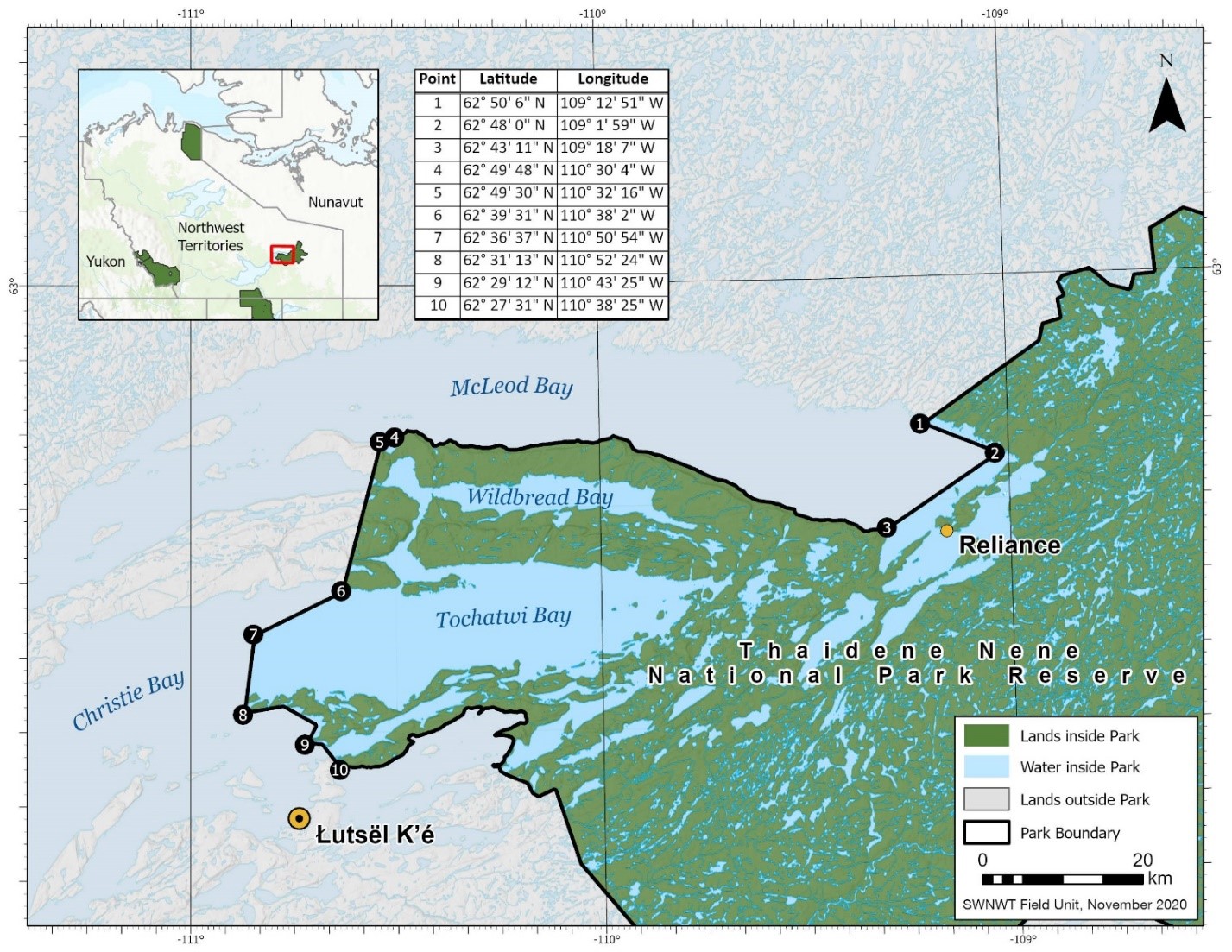
Restrictions
With the exception of Indigenous people who are harvesting or practicing
traditional use are and lease holders within the
Indigenous Protected
Area, all visitors must
register before entering Thaidene Nene National Park Reserve.
Groups are asked to limit themselves to 15 people. There is no
fee to register.
The following activities are restricted or prohibited in
Thaidene Nene National Park Reserve:
•Collection of rocks, plants and other natural objects - Visitors may harvest berries, medicinal and healing plants, and wood for campfires and temporary shelters, but must not remove other objects;
•Historic and pre-historic resources - Disturbing or collecting cultural or historic, resources and artifacts is illegal. Visitors are asked to report any cultural artifacts and their location; and
•Hunting - Only traditional harvesters, lease holders possessing a NWT small game hunting licence, or holders of a Special Harvester Licence are allowed to hunt.
The following activities are not restricted:
•Harvesting
berries and plants - Visitors are allowed to pick
berries and gather medicinal and healing plants in the Park
Reserve for personal use;
•Cutting
and gathering wood - Visitors can cut and collect wood
for personal campfires and temporary shelters;
•Pets
- Visitors may bring pets to the park but must keep
dogs and other pets under physical control at all times, not
leave pets unattended, and clean up after their pet(s);
•Firearms
- Visitors are permitted to carry firearms for defense
against wildlife; and
•Snowmobiles - Visitors are allowed to travel by snowmobile without a permit.
Permitting Requirements
Visitors who are applying for a film permit, research and
collection permit or a business licence, should ensure that they
submit an application early. These permits and licences are
reviewed with the management board, and depending on the
permit/licence, the review may require a preliminary screening
under the Mackenzie Valley Resource Management Act.
Please contact the Parks Canada office in Yellowknife, NT, by
calling 1-867-766-8460 or by emailing thaidene.nene@pc.gc.ca for
permits and additional information.
Permits are required in advance for the following activities:
•Fishing - A Parks Canada fishing permit is required, and NWT catch limits apply in the Park Reserve (NWT fishing permits are NOT valid within the park reserve, and the terms and conditions of a Parks Canada fishing permit are available online);
•Use
of drones/UAVs – Commercial drone/UAV use requires a
special permit. Recreational use of drones/UAVs is
prohibited;
•Film
permits - A film permit is required for anyone taking
pictures or video footage for commercial reasons (e.g., film
production, photography contract, or intending to sell images,
or providing images to expedition sponsors);
•Aircraft
- Take-offs and landings require a Parks Canada aircraft access
permit (and a business license is also required for all
charters and flightseeing companies), seasonal permits are
available at no charge;
•Guided
outfitting and business licenses - Commercial and
non-profit organizations require a business licence (including
any trade, industry, employment, occupation, activity or
special event carried on in the National Park Reserve, for
profit, gain, fundraising or commercial promotion, and includes
an undertaking carried on in a park by a charitable
organization, or by an organization or individual on a
non-profit basis);
•Fuel
caching - A fuel caching permit is required to store
fuel in the National Park Reserve. Public fuel caching is only
permitted at the Reliance fuel cache (permits are available at
no charge); and
•Research and collection - All research and collection of data and objects (including all natural science, social science, and archaeological research and collection) requires a permit.
Reporting of Incidents
Report all incidents, including those relating to wildlife, safety, spills and violations, to Parks Canada by calling toll free at 1-877-852-3100 or by satellite phone at 1-780-852-3100.
Contact Information
Thaidene Nene National Park Reserve
Parks Canada
Box 1166, Yellowknife Main PO,
Yellowknife NT
Canada X1A 1C0
Tel: 867-766-8460
Email: thaidene.nene@pc.gc.ca
Thaidene Nene National Park Reserve website
6.National Historic Sites of Canada
General Guidelines for National Historic Sites
Under the Canada National Parks Act, S.C., 2000, c. 32,
the Parks Canada Agency has the authority to manage national
historic sites under its administration on behalf of the people
of Canada and is responsible for granting permission to enter any
lands or waters for which it has jurisdiction. Visitor permits
and/or business licenses may be required to enter a national
historic site, and other permitting requirements may exist.
For general information regarding Canada's National Historic
Sites, please contact the Parks Canada National Information
Service at 1-888-773-8888 or information@pc.gc.ca,
or visit the Parks Canada website.
6.1Wrecks of HMS Erebus and HMS Terror National Historic Site of Canada
In 1992, the wrecks of HMS Erebus and HMS Terror
were designated as a national historic site under the
Historic Sites and Monuments Act, R.S.C., 1985, c. H-4,
despite the locations of both wrecks being unknown at that time.
The wrecks were designated for their direct association with Sir
John Franklin’s last expedition. In September 2014, an expedition
led by Parks Canada discovered the wreck of HMS Erebus.
Two years later, the wreck of HMS Terror was
located.
In April 2015, a 10 km by 10 km area of seabed
surrounding HMS Erebus was added to the National
Historic Sites of Canada Order, C.R.C., c. 1112. In 2017,
the site of HMS Terror was added, comprising a
protected area measuring 57.8 km2
(approximately 6 km by 10 km). The sites now benefit
from legal protection under the Canada National Parks
Act, S.C. 2000, c. 32 and relevant regulations, which
prohibit the removal of artifacts and allow for control of
access and activities that may damage the wrecks. This is the
168th national historic site administered by Parks
Canada and the first in Nunavut to be co-managed with Inuit.
Coordinates
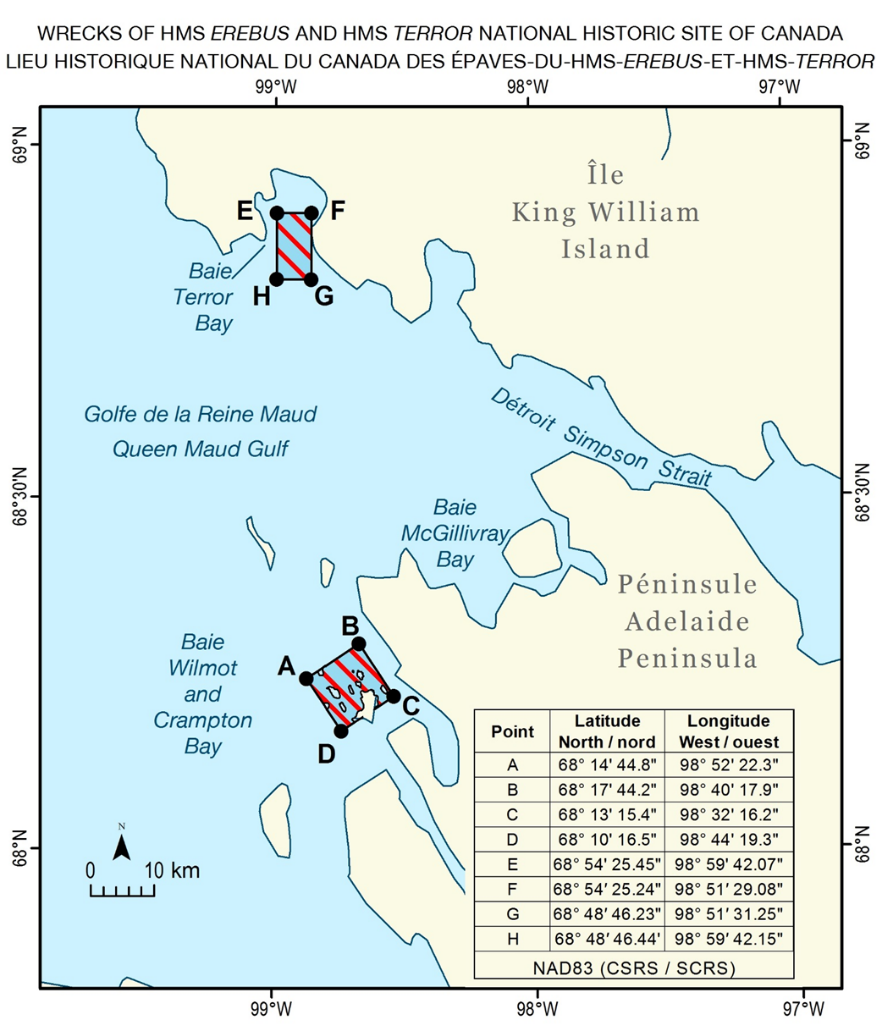
HMS Erebus Component
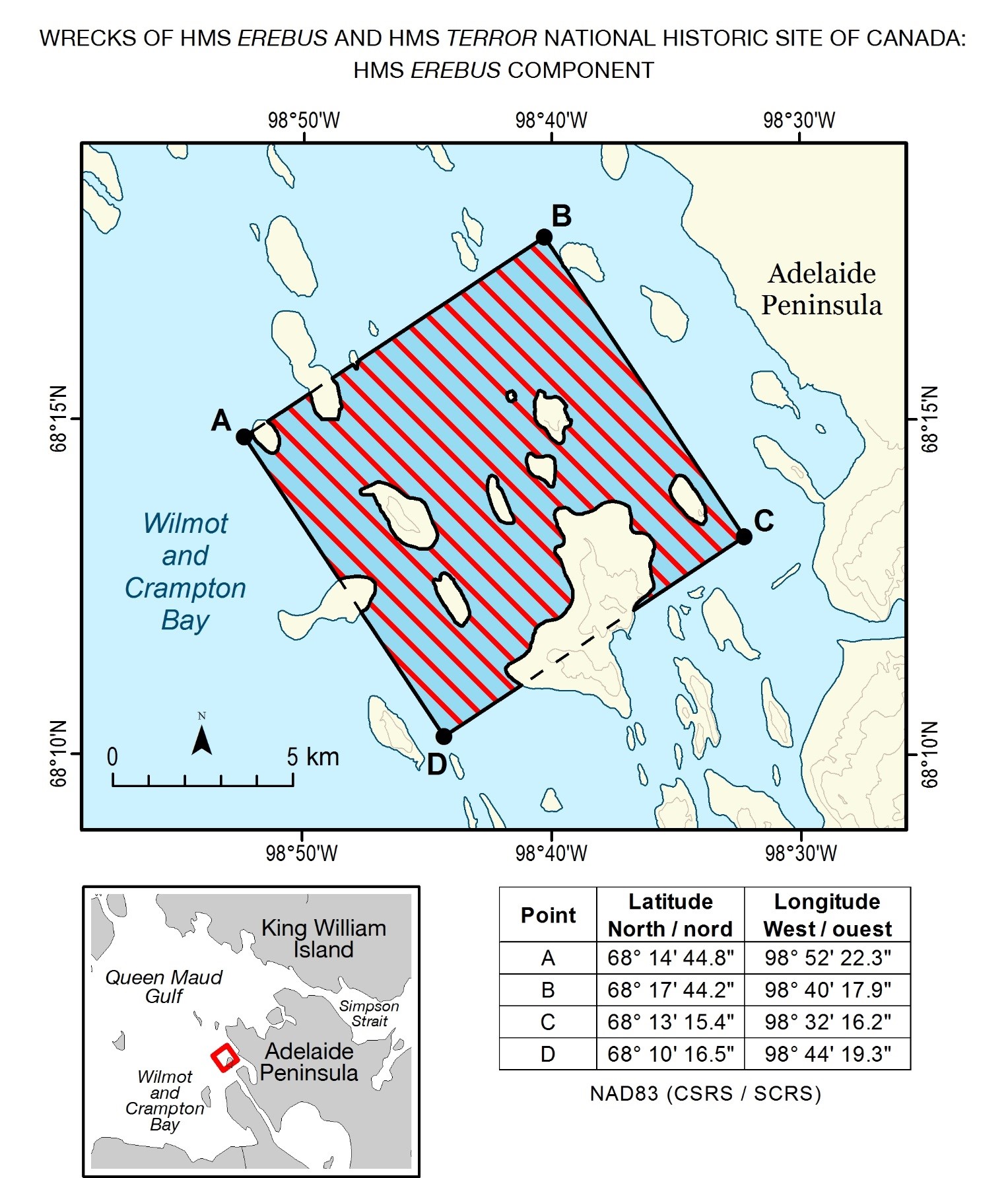
HMS Terror Component
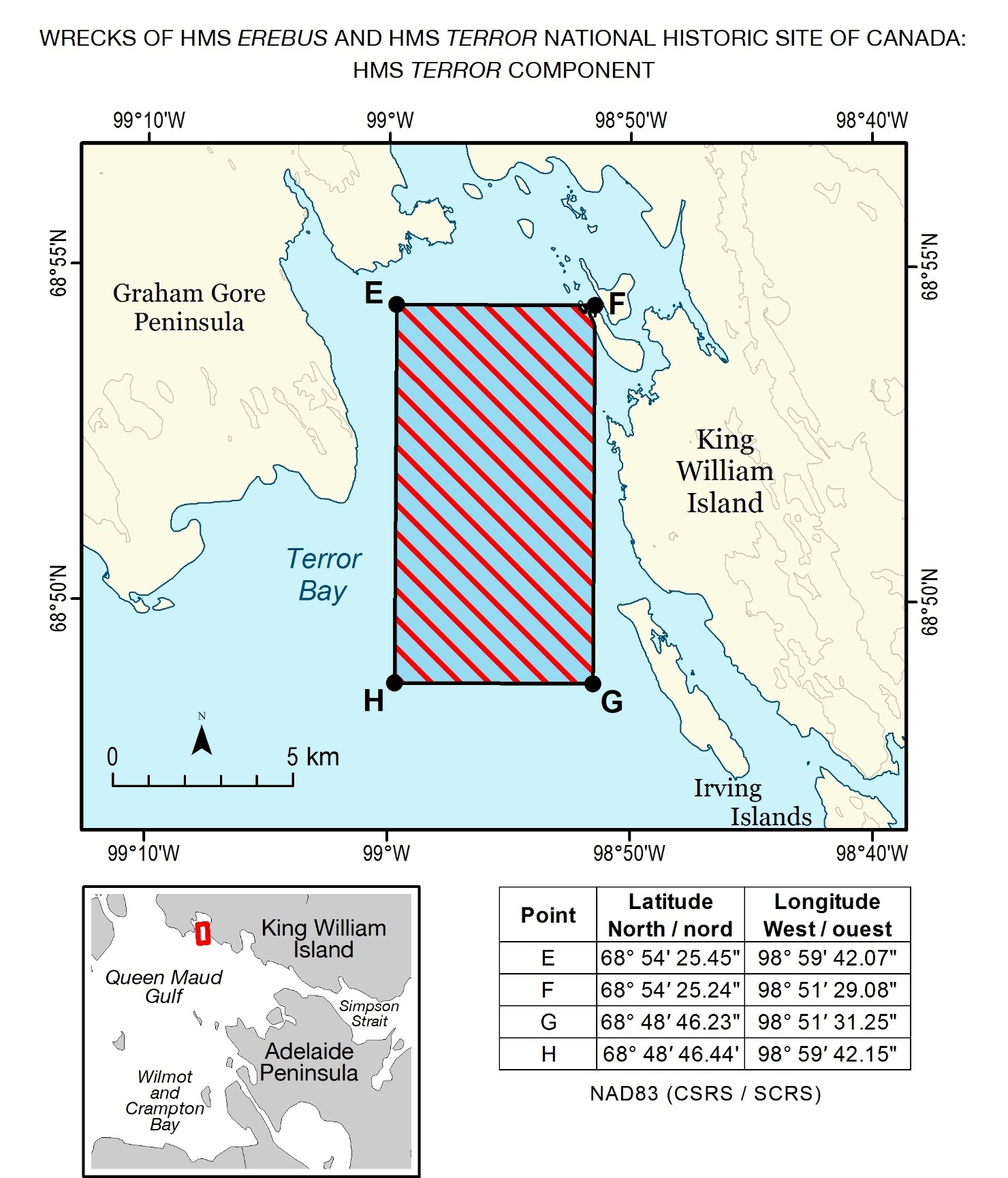
Restrictions and Permitting Requirements
1.No person shall enter the Wrecks of HMS Erebus and HMS Terror National Historic Site of Canada without written authorization from the Field Unit Superintendent, except where a person is an Inuk accessing the site for harvesting as provided in the Nunavut Agreement (NA). Cruise ships and other vessels are currently not allowed in the Wrecks of HMS Erebus and HMS Terror National Historic Site of Canada unless authorized by the Field Unit Superintendent.
Anyone wishing to enter the national historic site for official reasons (e.g., other government departments) should contact Parks Canada at least 90 days in advance of their trip.
2.No person shall conduct the following restricted activities without written authorization from the Field Unit Superintendent:
a.engaging
in activities for the purpose of discovering, surveying or
documenting archaeological, historical or cultural resources,
including wreck that has heritage value;
b.engaging
in activities that may physically disturb or damage
archaeological, historical or cultural resources, including
wreck that has heritage value;
c.removing
archaeological, historical or cultural resources, including
wreck that has heritage value;
d.anchoring,
except when undertaken by an Inuk under the Nunavut Agreement for purposes of
harvesting; and
e.diving,
except when undertaken by an Inuk under the Nunavut Agreement for purposes of
harvesting.
Reporting of Incidents
All incidents occurring within the Wrecks of HMS Erebus and HMS Terror National Historic Site of Canada must be promptly reported to the Marine Communications and Traffic Services Centre in Iqaluit using the available Canadian Coast Guard marine radio channel or by calling 1-867-979-5269.
Contact Information
Nunavut Field Unit
Parks Canada
PO Box 278
Iqaluit, NU
X0A 0H0
Phone: 867-975-4673
Fax: 867-975-4674
Email: nunavut.info@pc.gc.ca
6.2Pingo Canadian Landmark National Historic Site of Canada
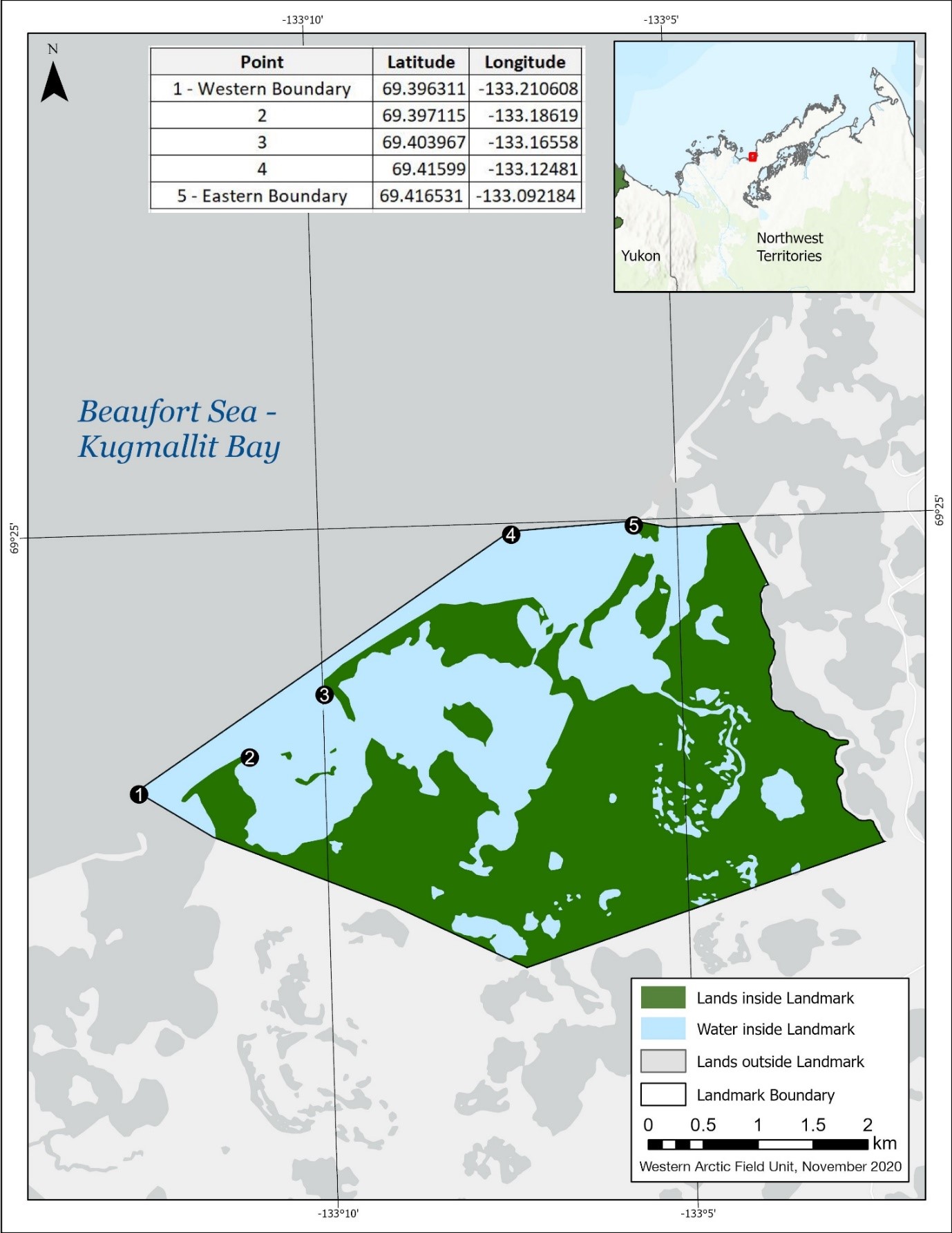
Restrictions
With the exception of Inuvialuit who have the free and
unrestricted right of access to the national landmark for the purpose
of harvesting, all vessels wishing to enter marine areas or land
a vessel within Pingo Canadian Landmark, must contact the park
office in Inuvik by phone at 1-867-777-8800 or email at infoinuvik-inuvikinfo@pc.gc.ca
prior to entering National Historic Site.
The following activities are prohibited in the Pingo Canadian
Landmark:
•Off road vehicles - Recreational use of all-terrain vehicles and dirt bikes anywhere within the Pingo Canadian Landmark, at any time of the year.
•Snowmobiles - Anywhere within the Pingo Canadian Landmark between April 15th and October 31st, and at any time of year on the actual pingos (from base upwards toward summit).
•Hiking on the actual pingos - From base upwards toward summit, between April 15th and October 31st.
Permitting Requirements
For information on obtaining a permit for any of the activities listed below, please contact the Parks Canada office in Inuvik by phone at 1-867-777-8800 or by email at infoinuvik-inuvikinfo@pc.gc.ca. Please note that some permit applications are subject to external impact assessment processes and it may take up to 4 months to issue a permit. Permits are required in advance for the following activities:
•Military
exercises - All personnel and equipment operating on
behalf of any Canadian or foreign armed forces for the purposes
of training, or entry and travel by any means;
•Fuel
caching - Storage of petroleum-based fuel in any
location for future use;
•Non-Inuvialuit
business activities and special events - Activities
conducted by non-Inuvialuit businesses (for example cruise ship
visitation);
•Filming or photography for commercial purposes - Filming and photography activities conducted where the photographer:
1)is
working to fulfill a commercial contract (including stock
agencies);
2)is
salaried for the purpose; or
3)Requires special permission or assistance from Parks Canada to access areas or resources (including Parks Canada staff);
•Use of drones/UAVs - The use of drones/UAVs requires a special permit, unauthorized use is illegal;
•Research and collection – All research and collection of data and objects (including all natural science, social science, and archaeological research and collection) requires a permit; and
•Transporting a firearm – on or through the National Historic Site.
Reporting of Incidents
Please report all all incidents, including those relating to wildlife, safety, spills and violations, occurring within the Pingo Canadian Landmark promptly to Parks Canada by calling 1-877-852-3100.
Contact Information
Pingo Canadian Landmark National Historic Site
Parks Canada
81 Kingmingya Road
P.O. Box 1840
Inuvik, Northwest Territories
Canada X0E 0T0
Phone: 867-777-8800
Fax: 867-777-8820
Email: infoinuvik-inuvikinfo@pc.gc.ca
Pingo Canadian Landmark website
Authority: Parks Canada
Report a problem on this page
- Date modified: